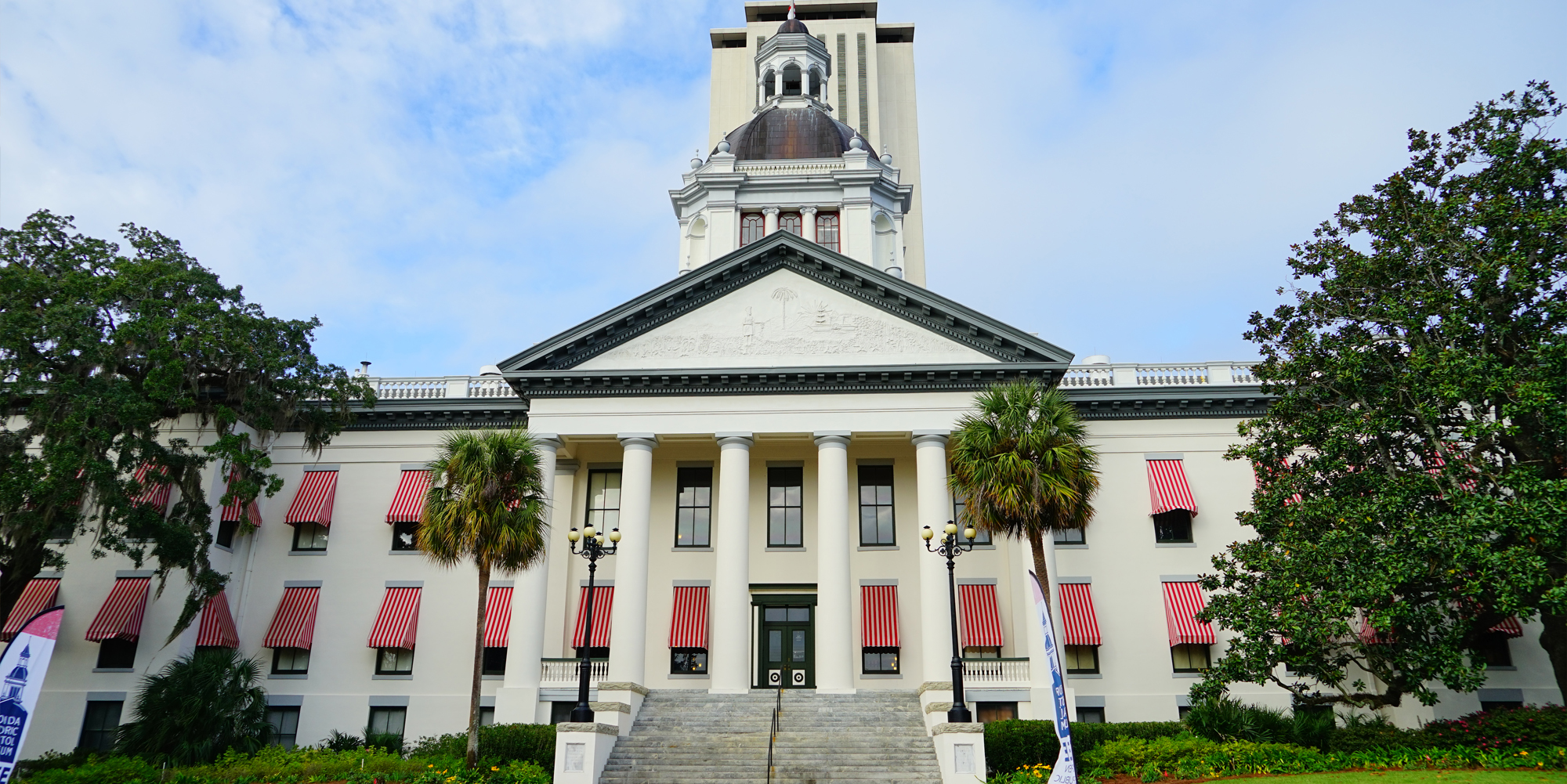Last month, Florida's Republican-dominated legislature demanded state colleges and universities hand over professors' and staff's communications about diversity, equity, and/or inclusion (DEI).
The legislature says this is to measure the "costs and benefits" of DEI offices and programming the state prioritized weeks after George Floyd's murder. Academics and their sympathizers see it as a sinister plot to stifle speech in college classrooms, turn Florida's higher education system into a conservative indoctrination machine, and serve the 2024 ambitions of Gov. Ron DeSantis (R).
Multiple sources say this, coupled with the largely unchecked rise in hate and extremism in Florida, are leading some academics to plan to flee the state and discouraging others from applying to attend or work at the state’s colleges and universities.
This week, professors around the state were informed which of their emails are to be turned over to the state.
An uproar ensued. Social media lit up with complaints from academics who believe the state is targeting anyone seen as an ideological opponent of DeSantis' hard-right politics. In conversations with the Daily Dot, multiple professors described an opaque process where it isn't clear who is deciding which faculty and staff emails to search, what search terms to use, and whether any effort is being made to ensure that the emails caught in the dragnet actually speak to the state's stated purpose.
The demand Florida House Speaker Paul Renner (R) sent to leadership of state universities last month directed them to turn over "all written or electronic communications, including but not limited to emails, texts, and social media messages" from Jan. 1, 2021 through the date of receipt.
Bobby Block, executive director of the First Amendment Foundation, said that the breadth of the materials that may be requested does appear to be an overreach, even given the broad access Florida law provides for public records.
“Your statements on your private account and have nothing to do with public business are exempt,” Block said. He added that even communications sent via a university email may not be subject to public records requests. “If it doesn’t concern public business, it is not public record,” he said.
The demand didn't come from his office, but DeSantis is widely seen as the driving force behind what some are likening to a "witch hunt" for academics who don't comport with his politics. Last week, DeSantis announced that he plans to ban diversity programs at state colleges. He’s also targeted education in the lower levels as part of his crusade against supposed “woke” policies on race, sexuality, and gender identity.
DeSantis’ office didn’t respond to a request for comment sent on Tuesday. The Florida House of Representatives directed the Daily Dot to a link to Renner’s press release about the demand and declined to comment further.
“It’s very disappointing and shocking in a number of ways to see these attacks from Gov. DeSantis and his supporters in the legislature,” Andrew Gothard told the Daily Dot on Wednesday. Gothard is president of the state’s faculty union, United Faculty of Florida. He also works in academia and is currently on leave from his position at Florida Atlantic University.
Gothard said that there is a lot of frustration and confusion about these demands. The union has already sent a cease and desist to one university, he said, which was ultimately resolved in the individual’s favor.
While some expected to have their emails searched given their course curriculum or position in the administration, others were blindsided.
A professor who asked not to be directly quoted provided the Daily Dot with an email they received that their university intends to send to the state. It was an event announcement they said they didn’t reply to. They also said they were surprised to be included in the search at all, as they don't teach classes related to DEI.
"It’s hard to discern if there was a systematic effort from the university side as to how they would identify people whose electronic communications would be searched," said one professor, speaking on condition of anonymity for fear of retaliation. "A lot of funky things get caught in that net," they added.
As public employees, state college employees’ emails are technically public record. But the state collecting a mass of them from so many—who were arguably following state orders—appears to be unprecedented.
All this is contributing to a growing culture of fear and outrage at Florida universities as DeSantis wages war on public education. Some are defiant and others are already censoring themselves for fear of losing careers that span decades. The professor who doesn’t teach DEI coursework said that they’ve nevertheless already changed lesson plans to avoid potentially running afoul of the state’s newfound animus towards such subject matter.
That professor said they feel betrayed by university leadership who, in their view, simply decided to give their emails to the state without a fight. But for some that outrage is tempered by sympathy for administrators, who are beholden to a state that's increasingly hostile to public education. Multiple people the Daily Dot spoke to pointed to DeSantis' recent moves at the New College of Florida.
New College is a tiny, public liberal arts school and longtime haven for LGBTQ and progressive students.
Last month, he appointed six political allies to New College’s board. Last week, the board fired the college president without cause. It appointed DeSantis ally Richard Corcoran, a former education commissioner whose candidacy for president of Florida State University was rejected two years ago amid uproar over his extremist politics and lack of experience in academia, as interim president to replace President Patricia Okker.
Okker, the first woman to helm New College, tearfully described it as a “hostile takeover.” At the same meeting, the board replaced the school’s chief legal counsel who had refused DeSantis-aligned board members’ requests to begin meetings with a Christian prayer.
This week, a professor told the Daily Dot that the events at New College were an "institutional beheading," which must weigh heavy on the minds of leaders of other campuses.
"I think there’s an acknowledgement that they’re in an impossible situation," they said.
DeSantis has been ramping up his attacks on Florida’s education system for over a year. Last year he signed the Parental Rights in Education Act, widely known as the Don’t Say Gay bill, as well as the Stop Wrong to our Kids and Employees (W.O.K.E.) Act. The former broadly targeted topics regarding sex, sexuality, and gender identity; the latter subject matter concerning racism. In recent weeks, multiple photos of barren bookshelves in Florida classrooms have gone viral.
Since y'all wanna play the "this isn't really happening" game https://t.co/bVUFOXPc6a pic.twitter.com/fUUkJgi5ls
— JagsFanBrian✊?✊?✊ (@JagsFanBrian) January 27, 2023
State colleges and universities arguably could have seen it coming, but some are still shocked by what they view as a rapid turnaround.
Just last year, DeSantis was praising the state’s colleges as “some of the best in the nation” after U.S. News & World Report again ranked its public higher education system first in the United States.
There’s also confusion over the state’s aboutface. Scarcely two years ago, the Board of Governors of the State University System was pushing universities to adopt the very DEI programs and curriculum that Florida now seems so eager to put on the chopping block.
In a lengthy memo sent to presidents of all the state’s public universities in October 2020, the board wrote of its “clear and steadfast commitment to prioritize and support diversity, racial and gender equity, and inclusion in the State University System and to hold each university accountable for policies, programs, and actions that will codify and operationalize the System’s commitment.”
Fourteen of the 17 members of the Board of Governors are appointed by the governor, which gives DeSantis significant influence over its actions. Nine of the current members, including the chair, were on the board when it issued the directive in 2020. While DeSantis may have been willing to stay out of its decision regarding DEI two years ago, the political winds have shifted sharply since then.
Gothard said that there’s a lot of misinformation circulating about DEI. He said that the vast majority of schools are spending less than 1% of their total budget on this programming and curriculum; a few may be spending at most 1.5%, he said.
Others raised questions about the costs of gathering and reviewing all these communications, plus the potential costs of arbitrating or even litigating objections to turning over such materials.
In the press release, Renner said the legislature will use these materials, plus accountings of the costs of DEI programs and curriculum, to “expose the potential misappropriation of funds” and ensure that students receive an “inclusive, well-rounded education” without “promoting an aggressively ideological agenda under the guise of diversity, equity and inclusion.”
The subtext to many is that the state will get rid of DEI programs and curriculum, including on-campus centers that provide the same, and potentially use the communications they’ve gathered to purge faculty and staff who’ve said things lawmakers don’t like. One professor told the Daily Dot that schools seem to have targeted those who are more outspoken in the public arena, regardless of the subjects they teach.
Gothard also pointed out that efforts to improve diversity, equity, and inclusion at state schools, which Florida seems poised to abandon, benefit a wide variety of historically marginalized groups. In addition to students of color and LGBTQ students, these programs “help first generation college students, veterans, students with disabilities,” Gothard said.
Many believe all this is simply DeSantis is trying to elevate his public profile in anticipation of a presidential run.
"DeSantis decided to burn public education in the fire of his political ambition," said Gothard.
Professors who spoke to the Daily Dot said that the governor sees academia as a “soft target,” because professors tend to be siloed into their respective schools of thought, competitive with one another, and often apolitical.
Now they’re afraid, and not just of losing their careers. Florida is home to a significant number of white supremacists and other bigots and has had multiple high-profile instances of hate speech in recent months, including on its campuses.
“They could release names, frame us in a certain kind of way…. It’s not just employment concerns, it’s actual physical safety,” said one professor.
They and others liken what’s going on in Florida higher education to McCarthyism or even fascism.
"This is just un-American shit," said the professor.







